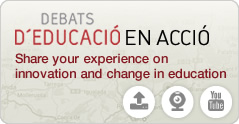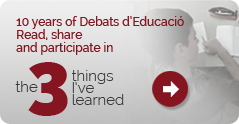- Català
- Español
- English
You are here
The spiral of inquiry: a tool for educational transformation
About the speaker
Judy Halbert and Linda Kaser
Co-leaders of Networks of Inquiry and Innovation and the Aboriginal Enhancement Schools Network
Synopsis
The spiral of inquiry is an innovative movement aimed at changing people's way of learning, and has been proven to improve academic results. The programme has been run in schools in British Columbia, Canada, among other countries, achieving positive results in all cases. For example, in British Columbia it managed to bring about a high in the number of people aged over 25 with more than two years of post-secondary education. What is more, the results are even more encouraging among students from disadvantaged backgrounds.
There is a series of basic principles that determine how the spiral of inquiry works:
- It's not so much an initiative as it is an overall approach to your work.
- Purpose, congruence, teamwork and perseverance are aspects that must be ever-present.
- We have to be ready to deal with times when there are doubts.
- The end goal is for all learners to realize all of their potential, without any discrimination, and for them to develop the skills they need to develop as adults with dignity.
- Curiosity is the key to progress, both for learners and for teachers.
- Implementing a new way of working requires time; things that are to stand the test of time don't bring clear results immediately.
How does the spiral of inquiry take shape?
1. Scan. The learners play a key role here. You have to talk to them to know what they want to learn and why they think what they learn will be useful.
2. Focus. You have to determine what the key questions are, choosing the area that will create the greatest impact.
3. Hunch. We need to think about potential actions or solutions based on our gut feelings, hunches that come from our professional experience and knowledge of reality. "What would happen if we did that?"
4. New learning. We learn new things following the previous points, which leads to progress. Teamwork is particularly important in this.
5. Act. You have to decide what you want to change, what to do differently in order to make that change, and then start to act.
6. Check. We need to choose indicators that will tell us if we're doing well.
Some questions for teachers to spark curiosity in their students
- Can you name two adults who are sure you'll do well?
- What are you learning? Why is it important?
- How are you getting on?
- How would you rate yourself?
- Can you give examples of how you can use your learning outside of school?
How do you manage to spread the spiral of inquiry throughout a whole school?
It's fundamental that it be led by people who are interested in building networks of innovation and inquiry. As more improvements are made, more people want to get involved, until the will to act becomes widespread.
How do you make curiosity systematic and constant?
It can't be imposed. Work based on investigation and discovery has to be voluntary. Actions are required to motivate people, such as celebrations and get-togethers. The work done also needs to be rewarded. The people involved have to feel proud of what they're doing.
How do you identify which challenges are important?
Dialogue is needed, question others and listen to everyone, not just a few people. You also need to share experiences and learn to extrapolate other people's actions.
With the collaboration:
Discover
other ideas
-

How to ensure that technological innovation improv...
Steven Hodas
2017 -

Cities as connected learning networks - The Pittsb...
Sunanna Chand
2017 -

Building a school for the digital natives generati...
Kirsti Lonka
2017







 The texts published on this website are, unless otherwise indicated, covered by the Creative Commons Spain Attribution - Non Commercial - No Derivs 3.0 licence. You may copy, distribute and transmit the work, provided you attribute it (authorship, journal name, publisher) in the manner specified by the author(s) or licensor(s). You may not use the material for commercial purposes. You may not transmit any derivative work from this material. The full text of the licence can be consulted here:
The texts published on this website are, unless otherwise indicated, covered by the Creative Commons Spain Attribution - Non Commercial - No Derivs 3.0 licence. You may copy, distribute and transmit the work, provided you attribute it (authorship, journal name, publisher) in the manner specified by the author(s) or licensor(s). You may not use the material for commercial purposes. You may not transmit any derivative work from this material. The full text of the licence can be consulted here: